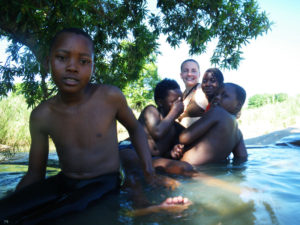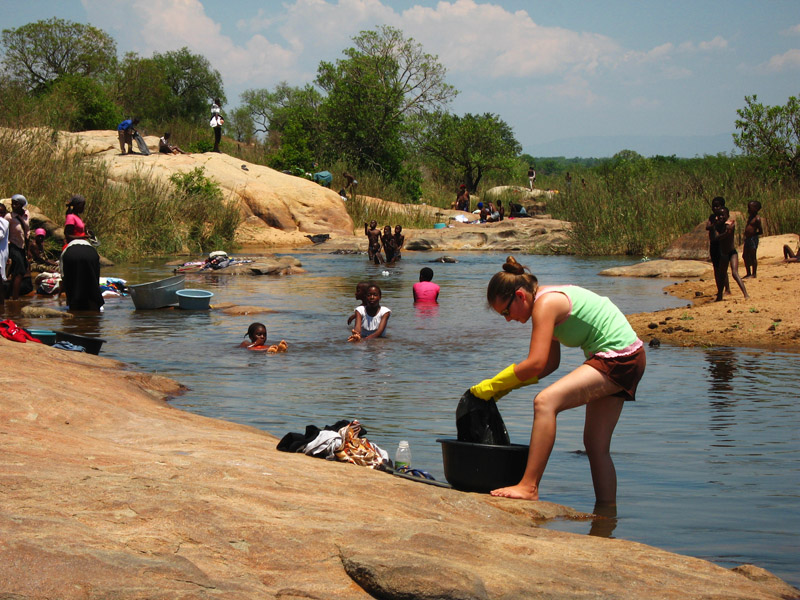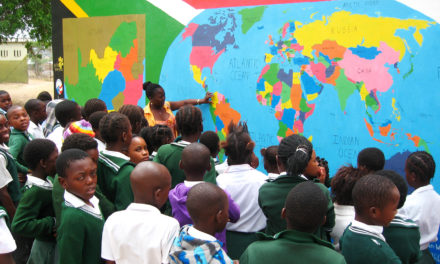Hi everybody. I thought that I, Lora, would try my hand at writing one of these newsletters. I found it quite difficult to put into words how my experience in South Africa has affected and changed me.
 I was at the river one Saturday doing my washing, and when I finished I went for a swim with all the children who were already playing in the water. This side of the river had a different atmosphere. It is nearer to the side of the village we stay in, so many of these children are over at our house daily and their families are now used to having white people near them; we attend their church and stay right across from the main store in the village.
I was at the river one Saturday doing my washing, and when I finished I went for a swim with all the children who were already playing in the water. This side of the river had a different atmosphere. It is nearer to the side of the village we stay in, so many of these children are over at our house daily and their families are now used to having white people near them; we attend their church and stay right across from the main store in the village.
Seeing me come towards them in the water with my blinding white skin, more exposed than usual, was no problem for them, and they were happy to have me. It was quite a contrast from the other side of the river. There the children stared at us in wonder and kept their distance even though they see us every day at school.
On this side of the river, I get out of the water and lay there with two of the girls. I lay belly down on a sand bed (as in the old days of laying poolside on a lawn chair, basking in the sun). But even here, the stark difference between our skin colors is unavoidable, bringing out the musings of one boy: “black and white, black and white,” he said. “White is nice. White people are very beautiful. But us black people, we’re like monkeys.”
Being moved by this observation (it is not the first time I’ve heard black people here compared to monkeys), I explained in the best Shangaan that I could conjure up, that “it doesn’t matter what color you are. We are all people and black people are very beautiful.” We are all people. The longer I’m here, the more of what’s being impressed on my heart is not our differences, but our similarities. In the words of Pat Cook, a former theatre teacher at Baylor University, I have been “…awakened to the many-colored coat of our sameness.” Reaching this point in my Peace Corps service (it has been over a year and a half) and having gone through the different stages of cultural adjustment, I can now say this is my home.
However, in the first stage of adjustment, all I noticed were the differences. It made me anxious because I didn’t know what to expect. I didn’t know the protocol. When things didn’t go as I desired, I often became frustrated and blamed myself. I thought I was the cause of these alleged problems. Inevitably, I often escaped into thoughts of home. I felt much like Frodo Baggins in The Hobbit (aside from just the short stature) of whom was written: “He was thinking once again of his comfortable chair before the fire in his favourite sitting-room in his hobbit-hole, and of the kettle singing. Not for the last time!” But my thoughts of home in the beginning of this journey were, as I mentioned, an escape. They were a way of trying to cope with the differences around me.
Yet slowly and gradually, I began to see patterns in the differences and to understand people’s actions, and even some of their thoughts.
One of the biggest things that bothered me when I first came to the village was the lack of curiosity. I was so excited to share myself with others, but they never seemed that interested when we talked of home. Nobody seemed to ever ask me questions about myself or my family. I was even astounded that they wouldn’t be amazed at how outstandingly delicious our food is. I mean, they eat mostly the same food day in and day out. There was no doubt our food would give them a high they never had before, right? It was not the case.
I thought, I am a connection to the outside world that they never get. Why are they not jumping on this opportunity?
Then you go to the schools. As you walk by the classrooms you hear the students repeating over and over exactly what the teacher says. Although the current education system is trying to move away from rote memorization, this is the predominant method of teaching and learning in the rural schools. Why? Because that is how the teachers learned when they were in school. They know nothing else. Most of them don’t know what it means to ask questions and to gain further knowledge. Their knowledge was always limited and kept at a minimum.
So can you blame the teachers when you receive fabulous new storybooks and they’re not interested? They never had books like that to read when they were kids. They never grew up with stories being read to them as we do. It’s an unexplored world. I began to understand. Through my efforts over time, I am understanding that many learn through observation and imitation.
Another thing that bothered me when I first came was the loneliness and alienation I felt. I longed for relationships with people in the village, but nobody came to the house. Nobody volunteered to show me around the village or even show me how to learn to do certain things. I was dying to learn about anything and everything, but it seemed nobody cared to teach me.
So, not knowing the rules of the game, I ventured out of my house to make visits. I found that sitting with someone in silence was very awkward for me. My language skills were minimal and there was nothing to do but sit. Yet, over time I realized how those visits made a difference to people. They would say they missed me if I hadn’t visited in a while. Some would even say that I was “scarce” or “running away.”
So, I started looking around and observing people together. Often they just sit, not saying anything. Or they walk slowly down the road together not saying much at all. It’s not that they don’t share news. They just obviously don’t feel the need to talk like we do. I began to understand.
I can sit with my grandma for an hour without saying much of anything, and her face lights up with gratitude that I visited her. Even a short visit of 10-15 minutes means that you value the person and want to have a relationship with them. It’s in your presence that they find joy. If a person works too much, it can be seen as a sickness. Here in the village, one must stop and be near the ones they love. You must keep your family close. You must keep your neighbors close.
Those were the two greatest causes of unrest in me at the beginning of my experience. And it was observation over time that brought me understanding. It was time that helped the people open their hearts to me in their own way. It was time that brought the exchange of two cultures, of two worlds.
Once I understood, it culminated in the conclusion I come to today: at the very core, we are all the same. We all learn from what’s available and make the best with what we know. We all desire relationships with other people. We’re all just people making it through life the best way we know how. And the best way we know how usually looks different. But it’s when we focus on the differences, that we risk thinking our ways superior. It’s then we risk conflict. It’s then that people put a value on skin color.
With that realization has come a release and freedom to be me, with all my Americanisms at the core of who I am. At the same time, I adopt as many wonderful aspects of South Africa as I am able. Each day I am becoming more of a complete person as I embrace the best of both worlds, whether it be in relationships, work, or day to day activities.
An even now, as I continue on this adventurous journey, I still have fleeting thoughts of home and of the people I know and love. When people here mention how our time is up this year and how we must be happy, I say that yes, I am eager to see family and friends. Not only that, but having this experience has made me appreciate my home culture and country in ways I never have before.
Yet herein lies the paradox: I tell them that I miss home, but as soon as I get home I will miss South Africa. When our time is up, South Africa will always have a piece of my heart. I am torn between two worlds. So all I can do is strive to be a person who is willing to learn and adjust to all situations, lands, and peoples.
As Paul says in 1 Corinthians 9:22, “…I have become all things to all people, that I might by all means save some.” To become all things to all people, I must work to understand the people with whom I live life, both here in South Africa and in my home culture in America. Only then can I be a vessel for the love of Christ and His peace.
And so I leave you with a poem, a poem that seeks to bring two worlds together as felt in my heart.
On the other side of the world,
I once built a life,
Of which I now sit and dream
On the other side of the world.
On the other side of the world,
Where friends talk, friends do,
Here friendship is just sitting in someone’s presence,
On the other side of the world.
On the other side of the world,
Chores are dull and alone, and finished quickly,
But I do my laundry at the river while I swim with my family,
On the other side of the world.
On the other side of the world,
The monotony of traffic is braved in the comfort of my car,
But on my bicycle I brave the cattle, the children, and the strength of the sun,
On the other side of the world.
On the other side of the world,
Church is big, with lights and sound, stimulating the senses,
Or just one small room with only the sound of voices around you,
On the other side of the world.
On the other side of the world,
A coffee shop is a place of stimulation or relaxation,
a place to plan and mingle, or of quiet reflection,
And it can be under a tree watching the children play,
as I hear people greet me as sister, mother, or “Happiness”,
On the other side of the world.
On the other side of the world,
I am going to sleep.
I am just awakening to life complete,
On the other side of the world.
And to the other side of the world,
I will go and come back again.





